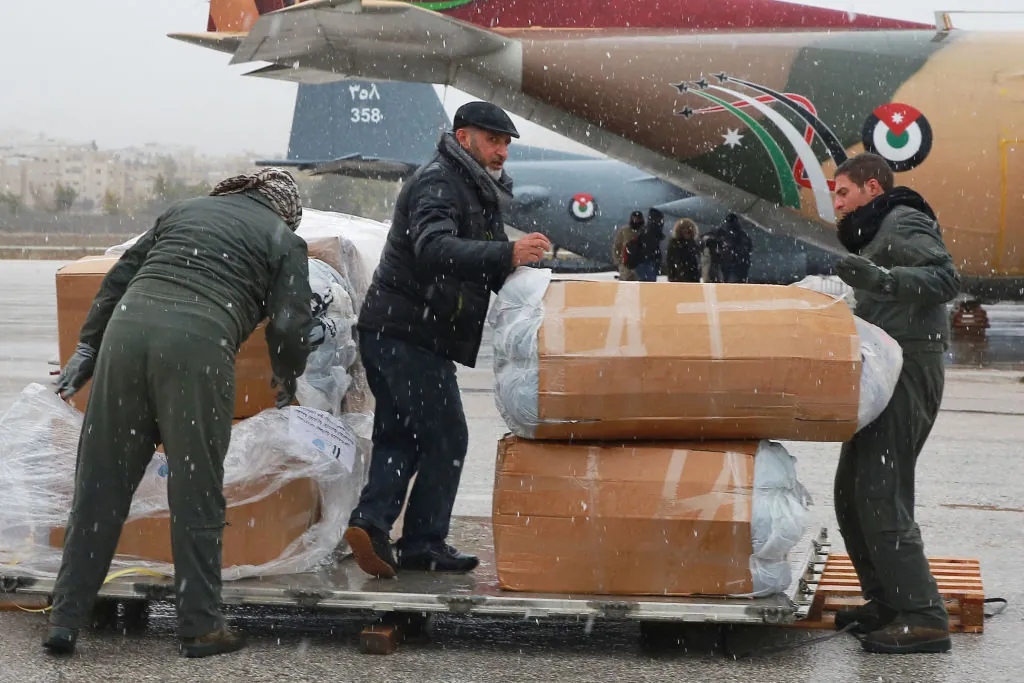As recent protests in Jordan underscore the country’s economic desperation, more pressure than ever is mounting on the kingdom’s humanitarian aid sector to help stabilize society at multiple levels, hampering the vitality of a critical U.S. partner in the Middle East. Indeed, as the United States pursues expansive bilateral joint initiatives ranging from security cooperation to commercial assistance, Jordan’s economic longevity ranks among U.S. policymakers’ most important regional interests; the U.S. has committed more than $20 billion to the country since 1951.
Humanitarian efforts are implicated deeply in this relationship, framing American engagement with the Syrian refugee crisis, civil society programming, and more; Western aid effectively parallels and supplements America’s diplomatic presence in the Hashemite Kingdom. Within this context, Jordan’s most prevalent and most important local actors are its small NGOs, a constellation of charity organizations that are indigenously Jordanian, operate only in Jordan, and tend to request cash from international nonprofits (INGOs) or government ministries to sustain their operations. The U.S. Agency for International Development (USAID), alongside many U.S.-based INGOs, deputizes small NGOs as local implementing partners, without whose assistance relief efforts could flounder.
Since the beginning of the refugee crisis. small NGOs have faced an extremely challenging funding environment. Financially, a series of federal restrictions constrain their ability to solicit donations, while competitive funding grants from INGOs undercut local impact and serve large organizations better than implementing partners. Administratively, by contrast, informal staffing structures and internal emphases on short-term funding belie small NGOs’ power to develop sustainable technical capacities.
The result is an NGO environment that suffers from severe operational inconsistencies, creating resiliency gaps from the bottom up in Jordan. Worse, this volatility feeds into Jordan’s existing economic problems, threatening broader instability at a critical juncture in Jordanian history. The United States has every interest in easing this financial chokehold. To that end, America and other regional actors can include NGOs more directly in their economic stabilization initiatives in Jordan, ensuring increased local capacity and greater economic wellbeing overall.
NGOs in Jordan
The current economic situation in Jordan has introduced a degree of national instability unmatched in the kingdom’s recent history. The combined impact of COVID-19, the Syrian refugee crisis, and the war in Ukraine nearly tripled the inflation rate and exploded unemployment to a peak of 25% in early 2021, triggering government-imposed price increases and extreme volatility in Jordanians’ spending power. The repercussions have compromised work across areas such as public health, refugee resettlement and assistance, democracy and civil society, private industry, education, youth employment, local development, and scientific research — all of which fall under the purview of Jordan’s humanitarian aid sector. In other words, humanitarian aid organizations are an indispensable thread in the country’s social fabric. Rarely has their help been in such high demand in Jordan, particularly for small NGOs, whose ground-level resources and knowledge often prove effective at the grassroots level.
6,605 registered humanitarian organizations can be classified as standard nonprofits (NGOs), community-based organizations (CBOs), civil society organizations, royal nonprofits, government nonprofits, or charities. Whereas CBOs must register with the General Union of Voluntary Societies, NGOs must register through the Ministry of Social Development. These distinctions largely originate from the 1966 Law on Societies, which established baseline governance and filing processes for associations not affiliated with the state. Jordan’s parliament amended this law in 2008 and 2009, partially liberalizing the registration process for domestic entities.


In practice, the procedures enumerated in the Law on Societies are sometimes subordinated to a regulatory system that functions largely at the whims of those administrating it. Only in some circumstances does the law guide decision making at higher levels; ancillary personal and political calculations as often prove the decisive factor. The Law on Societies therefore functions as more of a regulatory backstop than as an ironclad statute. However, it still wields power. Several quirks of its most recent iteration structure a system of minimum requirements, federal oversight, and state override mechanisms that effectively constrain the agency and resources of Jordan’s aspiring small NGOs.
First, every organization needs to create many professional roles internally to meet the baseline requirements of registration. Among those enumerated in the Law on Societies, implicitly or explicitly, are an accountant, secretary, board members, a director, and at least 21 or more members. From the outset, this places an administrative burden on associations or CBOs that hope to simplify operations by minimizing their administrative staff.
Second, societies must record minute details on all donations. If they come from non-Jordanians, according to Article 17, they must comport with specific rules and be approved by the Council of Ministers. This process slows down approvals, possibly indefinitely, and concentrates authority within the Council of Ministers, effectively handing purse string controls to the state. It also forces NGOs to focus their operations on parliament, compounding a dearth of coordination between them.
This game of funding chicken can work both ways. Article 17 also stipulates that the Council of Ministers has 30 days to issue a refusal or donations are approved by default. Consequently, bureaucratic inaction is not necessarily the worst thing for NGOs if their staff can stall for 30 days. Insofar as organizational politics are concerned, then, Jordan’s current system punts the focus from receiving a donation — or its subsequent approval/refusal — to its murky legal status during the 30 days before that refusal becomes legally obligatory. As a result, organizations that anticipate receiving tacit approval need to plan for funding at least 30 days before it is needed, forcing a greater degree of strategic planning than some organizations have the capacity to undertake.
Similar peculiarities arise from donations the Council of Ministers refuses. Although NGOs have the option to appeal the decision to Jordan’s High Court of Justice, they would need lawyers to plead their cases, implying further staffing demands for potentially menial results. Further, there is no apparent requirement that the Council of Ministers list any specific reasons for issuing a refusal, further complicating NGOs’ ability to challenge it in court. Finally, the Law on Society stipulates that any organization whose foreign donations are refused by the council must personally decline the donation from the donor. By forcing the NGO itself to decline, as opposed to a federal official, this system obscures the government’s regulatory role, creating a circumstance that invokes the state while placing the onus of refusal squarely on the individual entity. This could affect an NGO’s ability to solicit subsequent contributions from the same donors. And while donation refusal remains anomalous in Jordan’s NGO space, it is not unheard of: The NGO Tamkeen went to the High Court in 2012 after the Council of Ministers blocked it from receiving a $350,000 grant; the Court upheld The Council’s decision.

Third, many mandatory roles require large time commitments from more than a few members of society, meaning that more is asked of each individual. This poses additional challenges for many organizations, which are structured more to serve their constituencies than to include them in the administrative process. This reflects a fundamental difference of programmatic focus at the local level: Whereas many communities (and their extended donor communities) orient around the success of certain organizations, small NGOs tend to invert this approach, orienting themselves around the success of the community. Consequently, many do not meet the baseline criteria to register as NGOs and choose instead to operate as CBOs. This positions them less as hubs of communal growth and more as conduits for distributing resources and information at the grassroots, with stakeholders reaping greater benefits than the organizations themselves. However, it also normalizes individual organizations’ lack of institutional growth, virtually guaranteeing that their services cannot fulfill more than basic needs.
Consequently, from a legal and administrative perspective, the operational environment for nonprofits tends to suppress the growth of its smallest organizations. It is also not necessarily how things work in practice — it is only the legal principle that undergirds the system in theory. What matters more is enforcement: if government officials disregard the text of the Societies Law, then it may be a fig leaf for a system of quasi-legal control and consolidated authority that effectively deploys tendentious readings of NGO requests to justify its activities. Registered and unregistered organizations alike find themselves at the mercy of a state system that, in several cases, prioritizes its own interests over those of downstream actors.
Not all Jordanians are satisfied with this dynamic. Indeed, in 2021, members of Parliament formed a committee to amend the Societies Law once more. Despite this, the government scrapped the effort in early 2022, leaving small NGOs in a similarly precarious position.
The Funding Chokehold
Funding offers a practical solution to this conundrum. With more financial resources, small organizations could either improve their existing services or scale up, satisfying their twin needs to provide consistent help to their communities and to generate greater local capacity. However, the same rules that define each organization’s potential engagement with Jordan’s aid architecture frequently hobble local efforts to do so. A combination of legal, financial, and administrative challenges threatens broader instability among Jordan’s humanitarian organizations.
Specifically, small nonprofits can pursue one of three main funding paths for their projects and operations, all of which are fraught with challenges. On one hand, they could solicit donations internationally, which since the passage of a 2019 law would make them subject to funding oversight from the Ministry of Planning and International Cooperation (MOPIC). According to Daoud Kattab, a Palestinian journalist, the law was changed for national security reasons. Through the refugee crisis, so much unregulated cash entered Jordan that the kingdom grew concerned it could be used to fund domestic terrorist cells and government dissidents masquerading as humanitarian causes, according to Dr. Walid al-Khatib, Director of Public Opinion Polls and Surveys at the University of Jordan’s Center for Strategic Studies. Consequently, parliament approved the Foreign Funding Mechanism, a new law granting MOPIC the prerogative to review, approve, or deny all international contributions before they reach their recipients. Although a subsequent committee convened in 2020 to consider liberalizing the process, Human Rights Watch reported in 2023 that it had “done little if anything to ease the restrictions.”

This limits NGOs’ ability to receive money in several ways. In broad terms, MOPIC has the authority to determine which formal sector NGOs operate in, and therefore the sector in which they qualify to receive donations. In more specific terms, MOPIC decides whether case-by-case donations will be approved at all. Outside of decisions based on the nature of the donation itself, the vehicle for determining approval is often a request-for-proposals system that invites small NGOs to bid on funding to implement projects at the government’s behest. In other words, the government funds specific initiatives from a large pool of geographically, thematically, and operationally distinct proposals, elevating programs that advance state interests at the possible expense of more-focused developmental and humanitarian efforts. Yet as the regulatory guarantor of humanitarian cash inflows, MOPIC retains the ability to veto cash infusions for reasons ranging from national security to procedural inaccuracies.
Meanwhile, accepting domestic donations forces small NGOs to rely on more informal networks, many of which comprise the same needy individuals who seek help in the first place. Given many organizations’ focus on (and presence in) geographically small communities in Jordan, these networks are not primed to expand. Furthermore, small NGOs suffer from the lack of a strong fundraising infrastructure within Jordanian society. Writing in February 2022, Mary Kawar, Jordan’s former MOPIC Minister, identified three forms of common donating: one-time contributions; contributions to “tangible assets” like schools and mosques; or contributions to families and individuals. None of these, Kawar argued, produced the kind of systemic synergies that could amplify impact sustainably. Additionally, foreign assistance made up more than 7% of Jordan’s GDP in 2021. Islamic zakat (alms) obligations do not necessarily augment this picture, as the state controls them. Put together, these practices thus undermine the notion that a more robust domestic ethos of philanthropy exists among Jordanians for humanitarian aid organizations.
The third funding path is money made available from INGOs. Due to MOPIC restrictions on outside cash, many small nonprofits opt to pursue this relatively easier path. INGOs’ location in Jordan circumvents the difficulties of marketing donations overseas, and small to midsized NGOs often know the individuals who will evaluate their applications. As with MOPIC, however, the organizing principle of these funding requests is grants. Qualifying CBOs and NGOs apply for grants through requests for proposals, the terms of which are decided by INGO employees, often in consultation with the Jordanian government.
This creates several problems of its own. For one, a sustained reliance on INGO grants forces small nonprofits to compete for funding. With their staff and programming frequently overcommitted, the need to compete for grants creates additional administrative burdens for which some NGOs are ill-equipped — not unlike several provisions of the Law on Societies. Further, a strictly competitive process undermines potential opportunities for horizontal coordination, pitting aid recipients against each other despite ostensibly similar missions, visions, or areas of focus.
Small NGOs also often find themselves applying alongside private-sector development agencies, whose large resources predispose them to produce more effective grant proposals from the outset. The war chest of contractors and subcontractors that stems from commercial development agencies easily outmatches local capacity, even as for-profit companies tend to earmark comparatively larger grant portions for overhead, contracting fees, and other costs not directly related to the project. In Jordan’s active aid sector, small NGOs have few chances to prevail over these juggernauts.
The collective result of this financial chokehold is inconsistent funding for small NGOs, challenging crucial engines of social stability at the street levels of Jordan. This is especially true for Jordan’s most vulnerable aid recipients, which include refugees alongside diverse SOGIESC (sexual orientations, gender identities and expressions, and sex characteristics, previously known as LGBTQ) populations, women, and older adults. Indeed, small and midsized NGOs have large stakes in ensuring the present and future security of these communities, which acknowledge them explicitly as crucial humanitarian actors.
In this context, funding inconsistency threatens not simply the short-term needs of small populations in Jordan but also their capacity to build any long-term instruments of resilience or implement strategic planning at the NGO or CBO level, much less to conceive it. With few to no guarantees of money, as well as suppressed fundraising and administrative abilities, small NGOs face an impossible scenario: progressively higher demand for their work and progressively fewer means to undertake it.
Recommendations
The funding conundrum of small NGOs is not tenable in the long term. Jordan’s overall stability is precarious, and even low-level troubles could trigger broader social tremors. Although some have labeled the recent truckers’ strike and other protests “a ritual, not a revolution,” they nevertheless indicate a society whose patience for change grows increasingly thin. For this reason, the United States has pursued a single-minded policy in the Hashemite Kingdom: stabilize the economy as swiftly and sustainably as possible. According to Henry Wooster, the U.S. Ambassador to Jordan, economic wellbeing remains among the top priorities at the American Embassy in Amman, to both assuage social tensions and prevent state collapse. This was evident in September 2022, when the U.S. signed one of its largest-ever Memorandums of Understanding with Jordan, committing $1.45 billion in annual assistance until 2029. In this regard, Washington’s goals in Jordan are in lockstep with Amman’s.
To fully capitalize on this opportunity, small and midsized NGOs must be folded into America’s stabilization effort. Assistance from the U.S. would ensure local nonprofits can continue to provide critical services, like cash assistance or micro-loans, to their communities. Moreover, it could further ease communal stress by guaranteeing more consistent funding streams to NGOs that often lack long-term INGO grants or the administrative capacity to compete with better-funded or better-staffed NGOs. Within the Embassy, the Population, Refugees, and Migration (PRM) team is already leading the charge on these issues by creating new classes of smaller grants like the Julia Taft Refugee Fund, designed to aid small organizations at scale.
More can be done. Building on this effort, the United States can take three steps in the short to medium term to better secure the economic security of Jordanian communities. First, it can encourage INGOs to honor their funding commitments to Jordan, especially in the context of funding smaller organizations. Humanitarian promises to invigorate local Jordanian NGOs have proven largely hollow in the last years. Yet recent activity on the Grand Bargain 2.0 — a pledge from large nonprofits to donate 25% of their revenue to local nonprofits — underscores both the need for this encouragement and the resurgence of international political will to make good on promises that have eluded Jordan since mid-2016. Samantha Power, the USAID administrator, recently advocated for precisely this type of cash redistribution; more concerted advocacy from the embassy on this front would carry the message to Jordan.
Second, the United States can work with small and midsized NGOs directly to strengthen local efforts. PRM and USAID could develop joint grant categories that further broaden funding ranges, encompassing micro-grants and effectively democratizing the process for a range of keen nonprofits and civil society actors. This could have the downstream effect of directing more money to NGOs operating in disadvantaged parts of Jordan, allowing for greater impact within existing state frameworks. More broadly, these gestures could reaffirm the U.S. interest in uplifting Jordanians from the grassroots, as the availability of new financial and knowledge-based resources could effectively leverage America’s enormous footprint in Jordan to meet small NGOs where they are, rather than the reverse.
Third, the United States can coordinate with the Jordanian government to develop a new, holistic funding approach for small NGOs that prioritizes consistent, focused funding streams over the attractive yet quixotic ideas frequently highlighted through the request-for-proposals system. In its place, the United States and Jordan can work together to pioneer a system that restructures grant lengths and determination, deprioritizing money flows that pinwheel from place to place and augur surface improvements instead of deep communal growth. Sustainable funding could reverse this trend. MOPIC, in coordination with same members of Parliament who recently proposed amendments to the Societies Law, would be natural starting points for this conversation as the Jordanian government pursues widespread public sector reforms.
Above all, Jordanian and American policymakers must embrace the idea that the chokehold on funding for small NGOs’ can be alleviated through available tools and smart coordination. This starts by acknowledging the sclerotic nature of the current funding regime for nonprofits and entails working with Jordan to develop measures that equitably disburse humanitarian aid while opening more avenues for NGOs to procure it. Counting regional, municipal, and local nonprofits as both critical service providers in their respective areas and serious partners in economic stabilization will go a long way toward each of these steps. By easing their funding struggles, the United States, INGOs, and Jordan have a unique opportunity to break patterns of instability at the grassroots, improving outcomes for the long term.
Gabriel Davis is a 2022-2023 Fulbright Scholar in Jordan and Non-Resident Fellow at the New Lines Institute. He received his bachelor’s degree in Middle Eastern Studies from the University of Chicago. He tweets at @gabrielssdavis.
The views expressed in this article are those of the author and not reflective of an official policy or position of the New Lines Institute.






